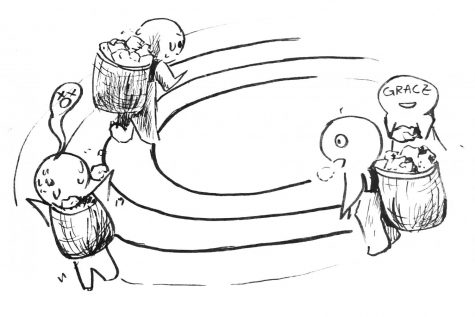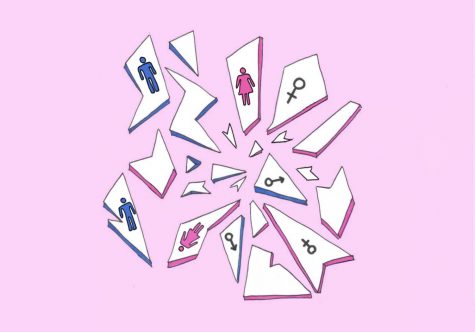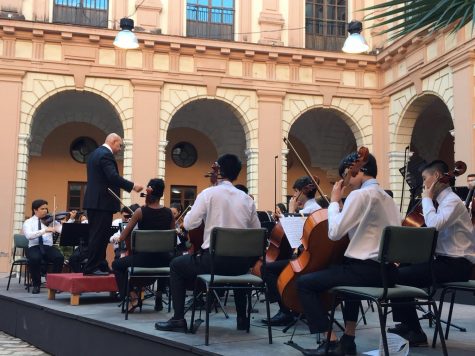Run, Zebras, Run! Acceleration at Groton

Imagine being told that you are not allowed to accelerate academically by skipping course levels, just because other people would feel pressured to do so as well. Despite the peer pressure it might generate, having the freedom to accelerate is one of the best aspects of Groton. Due to the amount of extra work acceleration demands, it self-selects for the people who should be accelerating.
However, the Groton Accelerate Challenge Enrich program (GRACE) is an institutional pathway for rising fourth formers to accelerate, thereby decreasing the self-selection that ensures the right students accelerate for the right reasons. The growing number of students taking GRACE often causes other students to feel obligated to do so as well or risk being perceived as unmotivated. Therefore, it is crucial that GRACE remain for a small set of students in order to prevent it from becoming a stressful road to acceleration.
Regarding acceleration as a whole, many students come to Groton because they seek academic challenge. Isabel Brown ’20, for example, commented, “I am very future-oriented…being in as many high-level classes as I can is the best way to get me where I want to go.”
But acceleration can become a slippery slope as people start trying to keep pace with their peers in every subject. Andrew Mazza ’20, for example, noted that “acceleration at some schools is seen as a selective thing, but at Groton it’s seen as the minimum or the standard.” Filip Engstrom ’20 concurred, saying that people often feel the need to accelerate because of “the pressure of always having to perform well.”
GRACE is a prime example of this issue. Although it can offer a way to fill in gaps in subjects such as English, Latin, and science, GRACE also becomes a way for students to jump ahead to AP classes, even if they had no prior foundation in those subjects. GRACE’s acceleration classes, called “B” courses, create an institutional pathway for students to “skip” entire courses by taking expedited versions of them in the summer. Therefore, the convenience of GRACE normalizes acceleration and diminishes the significance of the decision to accelerate.
David Prockop, the director of GRACE, understands this problem. He believes it is important to ensure that “only students who are ready for it and really eager for it” undertake acceleration. He does, however, think that having the ability to take GRACE to accelerate is unique and important. Megan Harlan, Director of College Counseling, agreed, observing that “for some students, jumping a level is absolutely the right thing to do and for other students it may not make sense given their interests, performance, and goals for their time at Groton.”
Because GRACE is an institutional pathway, many students perceive it as necessary and may feel that if they do not take GRACE courses, they will fall behind their peers. There is a certain tipping point, though. Mr. Prockop stated that in each of GRACE’s first three years (2016 to 2018), about 21 students were enrolled (approximately a quarter of the rising Fourth Formers). Last year, however, there were 36 students, which was about 40 percent of the form. This coming summer, Mr. Prockop is expecting even more students. If GRACE continues to grow, students taking its courses will become the majority, which will cause others to feel pressured to do the same: a vicious cycle.
For acceleration to remain selective (and healthy), it is absolutely critical that the leaders of GRACE keep the number of students under control so that the program does not just become an extra quarter-year of school for most students.
Moreover, to prevent students from feeling pressured to take GRACE, Mr. Prockop suggested to “keep advisors in the loop.” Advisors can help determine if a student is ready to take GRACE, so that students do not take it simply because they feel that, as Mr. Prockop described, “My roommate is going, so I should probably go.” Rather, the initiative must come from their own motivation.
It is imperative that Groton continues to offer acceleration through GRACE as an option for its students. However, GRACE must not become the standard path. As Mr. Prockop said, the leaders of GRACE must continue to try to “filter students a little bit and dissuade students who are on the fence from doing it if they don’t really want to.” Furthermore, they must keep the number of students taking GRACE in check. If these standards are upheld, we can keep the freedom to accelerate, but end the negative pressure to do so.









